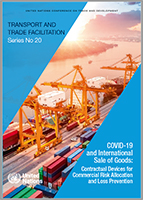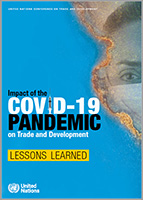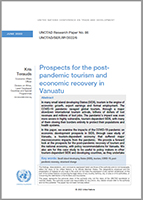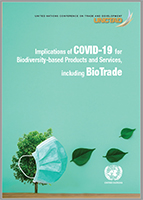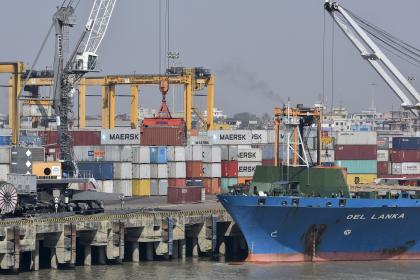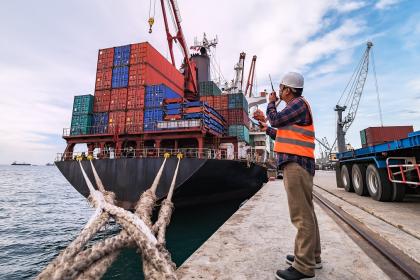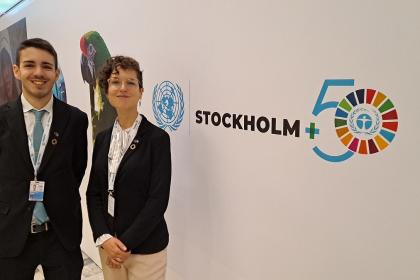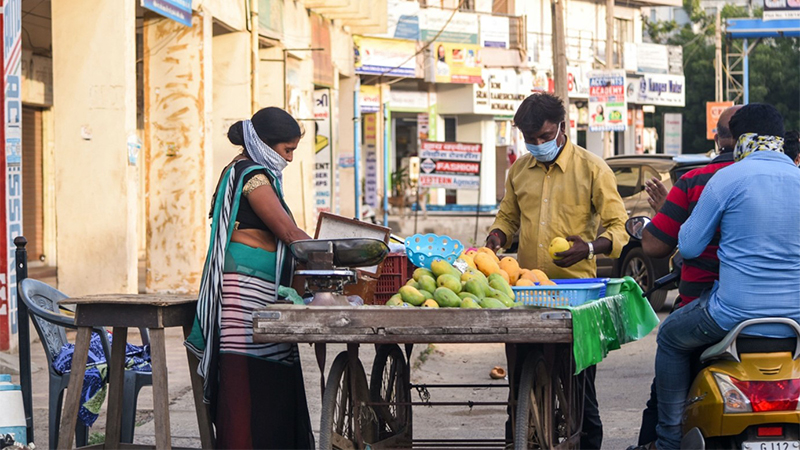UNCTAD is monitoring the effects of the global pandemic on manufacturing, trade, foreign direct investment and economic growth.
We stand ready to provide technical assistance that can help countries mitigate or recover from the economic impacts of COVID-19.
Publications
Podcasts
Videos
Support on the ground
From our work on the ground, we have gathered best practices, standard operating procedures, manuals and other resources that countries can use to limit the economic damage from the coronavirus and keep essential services running.
- How UNCTAD's e-government platform helps countries stay open for business during COVID-19 [PDF]
- Adapting the use of Asycuda World to the Covid-19 Situation: Guidelines to Customs Administrations [PDF]
- Repositories of measures on cross-border movement of goods and persons
- Ports in the fight against COVID-19
- Non-tariff measures and their relevance during the COVID-19 pandemic
Support for mitigation and recovery
UNCTAD stands ready to provide a range of technical cooperation products that can help countries put in place the policies, regulations and institutional frameworks as well as mobilize the resources needed to mitigate or recover from the impacts of COVID-19.
- Business Facilitation
-
Countries are using UNCTAD’s e-government platform to continue providing essential services and new COVID-19 fiscal rescue measures to businesses while offices are closed.
COVID-19 rescue measures, for which the platform, called eRegistrations, can be used, include social security administration for temporarily retrenched workers, business grant requests, handling of tax relief or late payment applications, and post-crisis recovery of state aid through tax systems.
UNCTAD can work remotely with governments to develop new online services using the platform. Simple online services can be created within two days, with more complex services (involving multiple governments offices) up and running within a week.
- Competition and Consumer Protection
-
The COVID-19 pandemic has opened the way for unfair, misleading and abusive business practices, hitting consumers hard and leaving the most vulnerable ones more disadvantaged. Such practices have required governments and consumer protection agencies to be vigilant and intervene to protect consumers effectively.
The pandemic and measures taken to prevent its spread have also strongly affected all economies, both developed and developing. Competition authorities have had to show flexibility through exemptions and exceptions to ensure the survival of businesses.
UNCTAD can support countries in identifying the set of measures and actions most appropriate to address key economic sectors affected by COVID-19, including through market studies and competition impact assessments of incentives and exemptions. It can also assist countries to strengthen consumer protection through coordinated enforcement and information exchange mechanisms, improved awareness-raising campaigns and complaint tools and measures addressing the needs of vulnerable and disadvantaged consumers.
- Customs Automation (ASYCUDA)
-
The UNCTAD Automated System for Customs Data (ASYCUDA) programme provides solutions to automate the entire customs clearance process for all stakeholders (economic operators, customs and partner governmental agencies) supporting fully electronic efficient and effective paperless processing of all formalities.
ASYCUDA has developed a series of practical recommendations for the tailoring of the ASYCUDAWorld system to balance the need for control and trade facilitation, whilst reducing physical interactions. The programme also offers assistance and expertise on business continuity plans to manage business disruption.
- Debt Management
-
UNCTAD’s Debt Management and Financial Analysis System (DMFAS) programme is providing developing countries with continuous support as they face the socio-economic challenges resulting from the COVID-19 pandemic.
Debt transparency and the availability of comprehensive, accurate and timely information on public debt are critical for policy decisions, risk management and the implementation of the emergency financing and debt moratorium measures adopted by the international community.
DMFAS offers countries a set of proven solutions for improving their capacity to manage public liabilities, to record and monitor public debt, and to provide reliable debt data consistent with international standards.
- E-commerce and the Digital Economy
-
UNCTAD’s eTrade Readiness Assessments are a key tool for least developed countries and developing countries to determine the status of their e-commerce sector and the steps required to optimize the benefits of the digital economy.
They provide specific policy guidance on how to bridge existing gaps through concrete action in seven policy areas. The assessments give UNCTAD access to a unique network of people making a difference in creating an enabling environment for e-commerce in their country.
UNCTAD taps into that network to monitor the impacts of the COVID-19 on trade, including digital trade, and to identify good practices that can be swiftly implemented within the most vulnerable countries. It supports efforts to use e-commerce as a solution to avoid trade disruption, foster access to essential goods and protect livelihoods.
- Entrepreneurship for Sustainable Development
-
Small and medium-sized enterprises (SMEs) are key engines of sustainable and inclusive growth. The SME sector is being hardly hit by lockdowns and other restrictions imposed by countries across the globe to contain the spread of the coronavirus, resulting in declining demands in several sectors, broken supply chains and logistics.
With its globally recognized role in the area of entrepreneurship promotion, UNCTAD assists policymakers and other stakeholders in its member states in their efforts towards supporting SMEs and entrepreneurship in the aftermath of the Covid-19 crisis.
In particular, UNCTAD through its network of Empretec centres in more than 40 countries in Africa, Asia, Europe, Latin America and Middle East helps entrepreneurs in identifying and tapping new business opportunities in a post-COVID-19 scenario.
- International Investment Agreements
-
Governments have adopted measures to mitigate the economic impact of COVID-19. These include stimulus packages to assist struggling companies, subsidizing SMEs, and the cancellation or reduction of taxes on companies.
While these measures are taken for the protection of the public interest and for mitigating the negative impact of COVID-19 on the economy, they could potentially result in investor-state dispute settlement (ISDS) proceedings initiated by foreign investors under international investment agreements (IIAs).
UNCTAD provides technical assistance to countries wishing to reform IIA provisions that could come into friction with such state measures. The assistance aims at empowering states with the necessary policy options to reform their IIAs to allow them to better respond to severe crisis of global magnitudes without risking expensive ISDS proceedings.
- Investment and Public Health
-
COVID-19 illustrates two fundamental weaknesses of the pharmaceutical sector: (1) The vulnerability of the international production chain, and (2) the limited production capacity of the originator companies to satisfy global demand in mass production of urgently needed novel treatments, diagnostics and vaccines.
The production of most pharmaceutical key ingredients is concentrated in a few countries. Some of them recently introduced temporary export bans, while others are experiencing serious disruptions of their supply chains for potential COVID-19 treatments and personal protective equipment. In addition, concerns exist over the supply of critical resources to poor developing countries at affordable prices.
UNCTAD is working with the World Health Organization, local producers, foreign investors and host governments to enable partnerships for scaling up manufacturing capacities in developing countries to diversify production and contribute to increased global manufacturing capacity. These partnerships require the handling of intellectual property rights in existing and future treatments.
- Investment Guides
-
The impact of COVID-19, including the closure of certain borders and the disruption of international travel and transport, has shown the risks of economic concentration in certain sectors and demonstrated the renewed importance of strengthening domestic value chains, ensuring food security and improving infrastructure.
Investment guides produced by UNCTAD and the International Chamber of Commerce are designed to help governments build their capacity to attract foreign and local investment. They provide investors with essential information on policies, procedures and opportunities that are otherwise scattered across many different websites or outright not available.
Being online and easily updatable, staff in investment promotion agencies are able to adapt the guides, while working from home, to refocus promotion efforts to key sectors such as agriculture, agro-processing, manufacturing and infrastructure as they seek to make their economies more resilient and stimulate job creation.
- Investment Promotion and Facilitation
-
UNCTAD’s investment promotion capacity-building programme helps countries to improve policies and institutional capacity for attracting and retaining foreign direct investment for sustainable development.
Assistance is provided through advisory services and training. In the context of the COVID-19 pandemic, the investment promotion programme has focused its efforts on assisting investment promotion agencies (IPAs) in dealing with the crisis.
UNCTAD is monitoring the response of governments and IPAs to COVID-19 and facilitating information exchange on best practices, such as those published in its advisory report entitled “Investment Promotion Agencies: Striving to Overcome the COVID-19 Challenge”.
- Non-Tariff Measures
-
Non-Tariff Measures (NTMs) were widely used during the COVID-19 pandemic. Over 140 countries resorted to the use of trade policy measures such as export restrictions, import facilitation, product safety, or national security measures, both to facilitate and to restrict international trade.
Often, the use of NTMs has unintended negative consequences. New UNCTAD research shows the use of NTMs during the pandemic and assesses their impact on the Sustainable Development Goals.
With frequently changing measures, transparency is important as well as good regulatory practices. UNCTAD tool’s respond to those two challenges and provide online capacity building courses for government officials as well as tailor made support on NTMs and COVID-19.
- Trade Facilitation
-
The COVID-19 pandemic poses an unprecedented global threat, also to global supply and value chains. Some of the measures that aim at reducing the international spread of the coronavirus are also crippling international trade and transport.
It is however crucial to keep international trade flowing, including of necessary medical supplies, donations and relief consignments while ensuring that border agencies can safely undertake all necessary controls.
UNCTAD’s tools respond to many of the challenges that countries are facing in relation to coordinating the flow of international cross-border trade. They include rapid scans of national emergency regulation framework in relation to cross-border trade; capacity-building for national trade facilitation committees, as well as on regional collaboration to facilitate and streamline cross-border trade and transport
Requests for technical assistance can be sent to tc@unctad.org.



